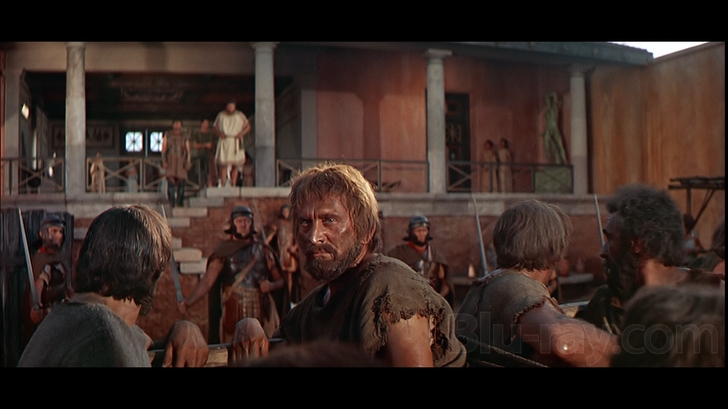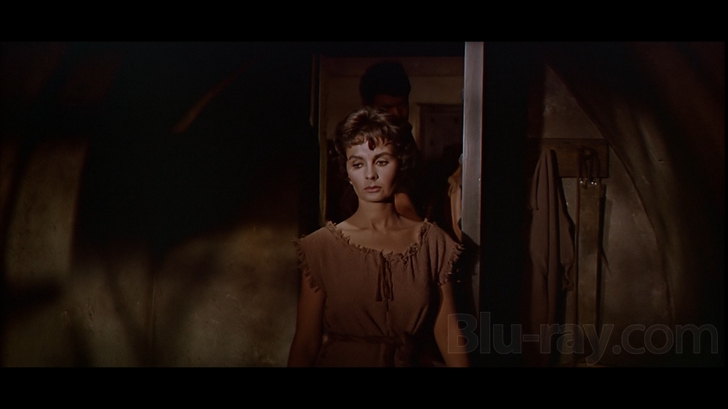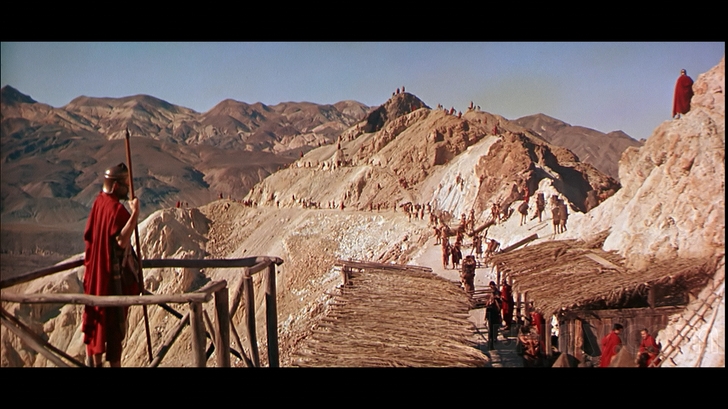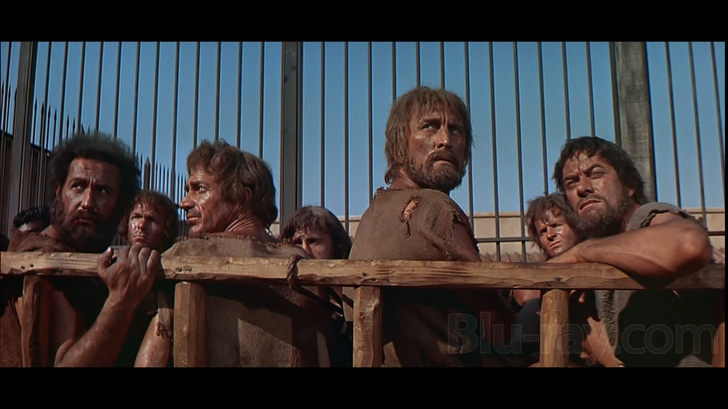Spartacus Blu-ray Movie
HomeSpartacus Blu-ray Movie 
Universal Studios | 1960 | 197 min | Rated PG-13 | May 25, 2010
Movie rating
8 | / 10 |
Blu-ray rating
| Users | 2.5 | |
| Reviewer | 3.5 | |
| Overall | 3.2 |
Overview
Spartacus (1960)
A slave leads a violent revolt against the Imperial Rome at its glorious height. Filmed in Technirama.
Starring: Kirk Douglas, Laurence Olivier, Jean Simmons, Charles Laughton, Peter UstinovNarrator: Vic Perrin
Director: Stanley Kubrick
| Drama | Uncertain |
| Epic | Uncertain |
| War | Uncertain |
| Period | Uncertain |
| History | Uncertain |
| Biography | Uncertain |
| Romance | Uncertain |
| Adventure | Uncertain |
Specifications
Video
Video codec: MPEG-4 AVC
Video resolution: 1080p
Aspect ratio: 2.22:1
Original aspect ratio: 2.20:1
Audio
English: DTS-HD Master Audio 5.1 (48kHz, 24-bit)
French: DTS-HD 5.1
Subtitles
English SDH, French, Spanish
Discs
50GB Blu-ray Disc
Single disc (1 BD)
Playback
Region free
Review
Rating summary
| Movie | 4.5 | |
| Video | 3.0 | |
| Audio | 4.0 | |
| Extras | 2.5 | |
| Overall | 3.5 |
Spartacus Blu-ray Movie Review
I am Spartacus. No, really!
Reviewed by Jeffrey Kauffman May 11, 2010Some of you may be old enough to remember the “Dark Ages” of the 1980’s when cable television was still a nascent entity, viewers relied pretty much on broadcast channels (all three or four of them) for their in home entertainment, and seeing a movie meant getting in your car and driving to a Cineplex for the event. For a dedicated classic film lover like I am, there simply weren’t enough niche movie channels on cable (American Movie Classics was about it, with an occasional “surprise” showing up on TNT), nor were there enough “art houses” showing vintage material, to ever make a dent in the huge catalog of classics I had long read about but never gotten the chance to actually see and experience. This may seem like ancient history to those “youngsters” reading this who are frankly spoiled by the glut of home entertainment media at their beck and call nowadays, but fans only a mere two decades or so ago were often left frustrated by vain attempts to actually watch famous films. Sometime a bit later in these same “Dark Ages,” a nifty little device known as the VCR started popping up more regularly, and suddenly we were overwhelmed with an avalanche of releases on the then “high tech” medium known as VHS. All at once, the big studios’ backlog of catalog titles were now available for the home viewer, anytime he (or she) wanted to see them. I was overjoyed at this possibility, and was soon gobbling up tapes as fast as my paycheck could buy them.
One of the first VHS items I purchased was a film I had long read about, but had never been able to see, Stanley Kubrick’s gladiatorial masterpiece Spartacus. The film had certainly made it to broadcast television by then, but you have to remember back in those days if you didn’t catch it on either its initial airing or its same season rerun, you were simply out of luck, often for many years. I still remember sitting down and watching the by current standards horribly soft, pan and scan images of that first (double) VHS set I bought, but even the less than optimal rendering the film was presented in couldn’t undermine the onscreen magic that Kubrick, stars Kirk Douglas, Jean Simmons, Laurence Olivier and Peter Ustinov wove. My only complaint that first time through was the oddly off-putting sound of co-star Tony Curtis’ Bronx accent, with its over-attacked final consonants (like pronouncing the final “g” of song), something which grated against the eloquent sound of Olivier, Simmons and Ustinov.

Aren't movie stars supposed to be glamourous?
Spartacus has often been lauded as the thinking man’s epic. Unusually intimate despite its scope, the film is based on the actual historical uprising of Roman slaves circa 73-71 B.C. The film deals frankly and often quite disturbingly with the cavalier treatment of this underclass, specifically the men who were trained to fight to the death as gladiators, all for the “entertainment” of the Roman ruling elite. While scenarist Dalton Trumbo, adapting his “dreaded” Communist cohort Howard Fast’s novel, made no secret he was drawing parallels to the plight shared by the blacklisted Hollywood Ten, the then contemporary political backstory really doesn’t need to figure into the audience’s appreciation of the piece. In fact, it may actually be more a distraction and a well intentioned though perhaps opaque reference by Trumbo that only really adds emotional power in the climactic scene where rebel after rebel proclaims “I am Spartacus!”, in a valiant, if ultimately hopeless, display of solidarity before the Romans who would soon literally crucify them. As someone who had a close personal relative called before the HUAC in the 1950's Red Scare, I can tell you that kind of bravery was and is a rare commodity.
While the film is perhaps too long (it was severely cut for a re-release, and then famously restored by Robert Harris for a 1991 re-re-release, the version presented on the previous Universal SD-DVD, HD-DVD and the Criterion Collection SD-DVD), it is buoyed by an ensemble, both in front of and behind the camera, of perhaps unmatched power and finesse in a film from this era. Star Kirk Douglas was intimately involved in the production from day one, in fact pre-day one, as Douglas wanted a similar product to remove the sting of not being chosen to play Ben Hur in William Wyler’s own epic from 1959. Douglas was the “power behind the throne” in Spartacus, with his own production company, Bryna, holding the reigns over the film. That meant it fell to Douglas to fire the film’s original director, Anthony Mann, a mere week into the massive production. Douglas brought his Paths of Glory helmsman, Stanley Kubrick, onto the set, though Kubrick found himself somewhat strangled by the power structure already in place on the film. While Mann is routinely credited with only filming the opening “Libyan” scenes (actually Nevada), there are scenes throughout Spartacus that feel resolutely anti-Kubrickian, including a wealth of surprisingly showy, if always well handled, crane and tracking shots.
There’s some debate as to how much of the film ostensible DP Russell Metty actually shot (Kubrick evidently took over control of that, as much as possible), but the film has a gorgeous look in both the location footage and the more studio bound segments (which Kubrick preferred, again for control reasons). Contributing mightily to the film’s visceral impact is an at times startlingly atonal score by Alex North, who nonetheless also offers the achingly lyrical Spartacus love theme, made famous in a resplendent jazz piano version by Bill Evans. But it’s probably the stellar cast that lingers in the minds of most viewers. Aside from Douglas’ stalwart, tragic performance as Spartacus, Jean Simmons is both sizzlingly dignified and beautifully vulnerable as love interest Varinia, a slave girl sold to scheming Roman General Crassus (Laurence Olivier). Crassus is involved in a power struggle with Gracchus (Charles Laughton), who similarly schemes with a young up-and-comer named Julius Caesar (John Gavin) to preserve the republic. The aforementioned Tony Curtis is on hand as slave Antoninus, initially sold to Crassus, but soon Spartacus’ right hand man and spewer of oddly accented poetry. Oscar winner Peter Ustinov portrays lovable if slightly despicable Lentulus Batiatus, head of the gladiatorial school Spartacus is sent to, but who later has a change of heart (helped along by the violent slave uprising and a whipping or two).
This is a film which builds surprisingly quietly (despite its bombastic battle sequences) to an unusually moving set of denouements which should leave all but the hardest hearts moved. Aspects of friendship, loyalty, political correctness, freedom, justice and, yes, undying love cascade through the main characters throughout the final moments, leading to a devastating pair of final scenes between Douglas and Curtis, and then Douglas and Simmons. Trumbo is never at a loss for words, filling the screenplay with one of the most intelligent discourses on what it means to be a republic, especially a republic beset by turmoil both from within and without. When part of the turmoil is a class of enslaved inhabitants (not yet a citizen, obviously) yearning to be free, the debate becomes dramatically more arch and meaningful. Despite the often hyperarticulate nature of the dialogue, Trumbo fashions a sharp and really quite funny at times scenario, painting in shades of gray that highlight the duality of most of these characters. Yes, Spartacus is a perhaps two-dimensional hero, but so many of the supporting characters are fleshed out so brilliantly, both in the writing and especially the nuanced performances, that ultimately one doesn't really care that much, particularly when those two dimensions happen to be freedom and honor.
Kubrick never really visited a massive canvas like this again, despite fashioning different kinds of epic with films as disparate as 2001: A Space Odyssey and Barry Lyndon. This is not the lugubrious Kubrick of either of those films (let alone Eyes Wide Shut), despite Spartacus' more than three hour running length. This is a film that manages to cut to the bone while never ignoring the real flesh of its characters. It may in fact be the thinking man's epic, but it tugs at the heartstrings as few films of this ilk ever have.
Spartacus Blu-ray Movie, Video Quality 

Spartacus has had an interesting, if at times questionably spotty, release on various home video media. I defer to the man I consider to be the definitive source on what Spartacus "should" look like, the film's 1991 restorer Robert Harris, who told me that he considers the Criterion SD-DVD "color and density correct." So let's leave the previous Universal SD-DVD and certainly the troublesome HD-DVD aside and address how this new AVC encoded 1080p Blu-ray stacks up to the Criterion. I did a side by side test and came to a few conclusions. The film is undeniably cleaner in the Blu-ray presentation, with that digitally scrubbed look which argues to DNR. The good news is we're not at the extreme plastic levels of Patton (which is not saying much), but the bad news is those with humongous projection sets will be missing some detail, and even smaller sets will reveal the smooth, textureless façade of DNR that wipes away a lot of the filmic look of the feature. On a 46" LCD flatscreen, I found the DNR to be relatively minimal by modern (often hyperbolic) standards, perhaps a backhanded compliment. Despite the smoother texture, there are still occasional flecks and specks to be seen fleeting through the film, though evidently nothing at the level of the HD-DVD (at least according to the reviews I read--I never saw that version). This may be more than odd, in fact a misperception, as Harris avers that all recent releases come from the same interpositive source elements. The color timing on this Blu is a more interesting phenomenon, at least to my eyes. It is certainly much more densely saturated on the Blu than the Criterion, and it appears quite acceptable taken by itself. When compared to the Criterion however, I personally feel there's a clear, albeit slight, tilt toward the red-yellow side of the spectrum, perhaps the result of an anxious telecine operator's knob. There's nothing here that is going to make an average viewer avert their eyes in horror, but these are very subtle, interesting differences that will probably entice more as an intellectual exercise than any deciding factor in your enjoyment of this presentation. The third element is edge enhancement, which, while not as egregious as in some recent releases, is still quite evident. In fact, you'll see it in some of the screencaps included in this review. Pay attention, for example, to the ringing around the assembled multitudes on horseback. My gut feeling about all of this is if you haven't seen the Criterion SD-DVD, you're probably going to be OK with this Blu--it certainly doesn't devolve to the level of, say, Patton or, more recently, Out of Africa. Those with a history with this film may find this a more troublesome release, perhaps not as bad as the HD-DVD evidently was, but bringing its own nettlesome worries into the fray. The sad part is the Criterion release presented the film as close to Kubrick's original vision as we're ever likely to get. It could have been used as a reference for this Blu, but it certainly doesn't seem like it was.
Spartacus Blu-ray Movie, Audio Quality 

Spartacus would seem on its face to be a prime candidate for a 5.1 repurposing, but I've found all of the 5.1 mixes on the previous SD-DVD releases a little lacking, and I'm afraid a lossless option here with a DTS-HD MA 5.1 mix doesn't really persuade me to change my mind. I can't quite decide if this is because of the original sound design of the film, its basically intimate nature, or, indeed, the 5.1 repurposing in and of itself. There are some source element issues to be contended with and unfortunately the lossless audio only highlights many of the differences in the post-looped dialogue. I was repeatedly struck by the vastly different sounds of Ustinov, sometimes within one bit of dialogue, which points to perhaps several post-production recording sessions for looping. Ustinov's nasal qualities also may help to point out the narrow, boxy sound of some the dialogue, but that same narrowness is certainly there throughout the film if you're attuned to it. The 5.1 works best to my ears with the antiphonal moments of North's score (which sound magnificent), as well as the large crowd scenes, where some of the compressed sounding highs and lows tend to melt into the overall mass of sound, and one can finally relax a bit into the immersion without overt "listening" for individual effects. For anyone who's already seen one of the SD-DVD releases of Spartacus, if you haven't had anything to complain about before, I doubt you will now. There is a decent enough dynamic range, with very good to excellent fidelity throughout the film. There's simply no getting around the original recording techniques of some of these stems, however, and unfortunately shoving them off to a side or rear channel only tends to make the problem more noticeable. Taken on its own, and divorced from my individual dislike of this particular 5.1 remix, my hunch is the bulk of listeners will be pleased with the results here.
Spartacus Blu-ray Movie, Special Features and Extras 

Don't go looking for Criterion-sized extras on this new Blu-ray, though some of the extras from the superlative two disc Criterion set have made it onto this release. In any event, aside from the theatrical trailer and an image gallery, we get a couple of archival Interviews, one with Ustinov, one with Simmons, done to promote the film in 1960. The Simmons interview is especially amusing as she's "answering" questions from a script, with pauses in between, so that local stations could insert their own reporters "interviewing" the star. One caveat: the first time I tried to access the Simmons interview, I got an error message on my PS3 stating "Mode not supported," with audio only continuing and no video, something I have never seen before in years of playing Blu-rays. I went back to the Extras menu and selected it again, and this time it played fine. A couple of supposed Deleted Scenes are included, but they're actually edited scenes for the 1967 re-release, as well as the UK version of the film. The end of the complete Laughton suicide scene is also ported over, with audio only for the final few seconds, from the Criterion release. Behind the Scenes at Gladiator School (5:11) is a brief look (without sound) of Douglas and the troops learning how to cut each other to shreds. Five Vintage Newsreels totaling less than five minutes are also included. Spartacus comes BD-Live enabled.
Spartacus Blu-ray Movie, Overall Score and Recommendation 

Criterion released what is the gold standard of this title a few years ago. Supervised by Robert Harris, and meticulously restored and color timed, it offered the film in a version with a tacet Kubrick imprimatur. Unfortunately licensing deals usually only last for around three years, and Spartacus has reverted back to Uni now for its initial high def presentation. This is an OK placeholder for the time being, but I bet rabid videophiles will be counting the days until Criterion can go back to the Blu drawing board and give this legendary film the HD release it really deserves.
Other editions
Spartacus: Other Editions

Spartacus 4K
1960

Spartacus 4K
1960

Spartacus
Academy Award Series
1960

Spartacus
1960s Best of the Decade
1960

Spartacus
Restored Edition
1960

Spartacus
Universal 100th Anniversary
1960

Spartacus
1960

Spartacus
Restored Edition
1960
Similar titles
Similar titles you might also like

Lawrence of Arabia 4K
60th Anniversary Limited Edition
1962

Rome: The Complete Series
2005-2006

Cleopatra
50th Anniversary Edition
1963

Patton
1970

Jarhead
2005

Cleopatra
1934

The Red Baron
2008

Che: Part Two
2008

Che: Part One
2008

Quo Vadis
1951

Barry Lyndon 4K
1975

El Cid
1961

The Fall of the Roman Empire
1964

Ben-Hur
Fiftieth Anniversary
1959

Joan of Arc
1948

Generation War
Unsere Mütter, unsere Väter
2013

The Leopard
Il gattopardo / Italian and American Versions
1963

Schindler's List 4K
25th Anniversary Edition
1993

Full Metal Jacket 4K
Rerelease
1987

Testament of Youth
2014